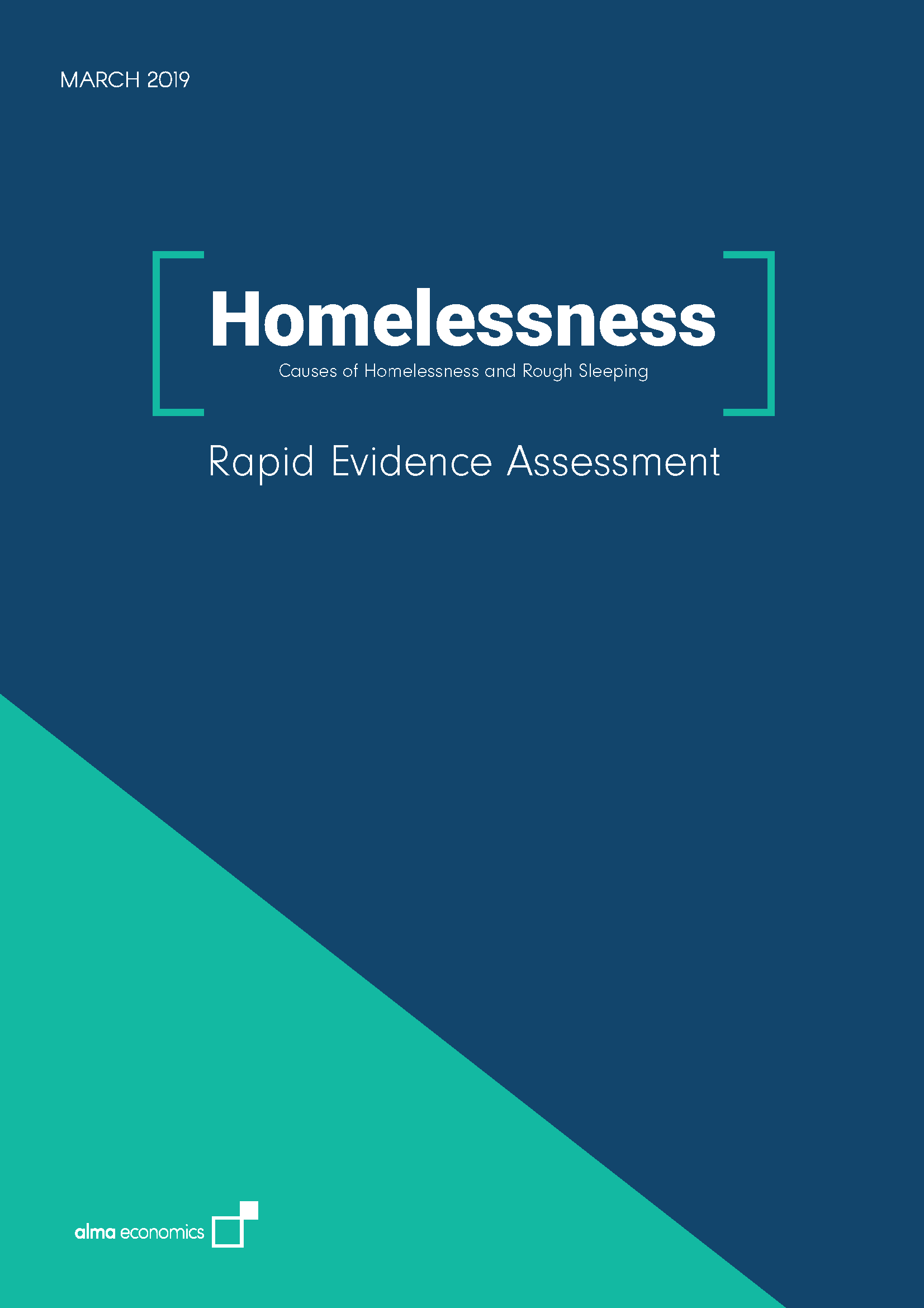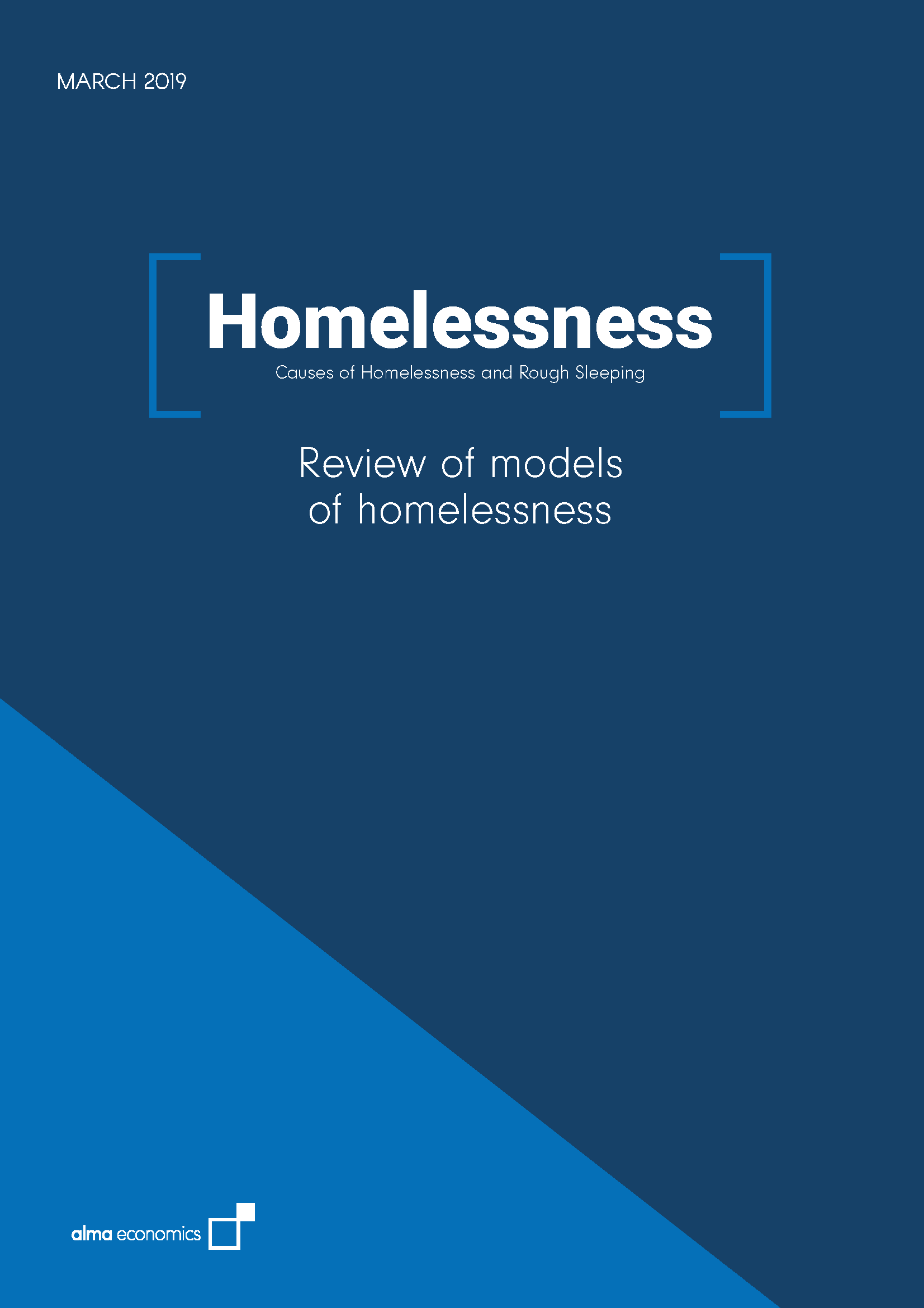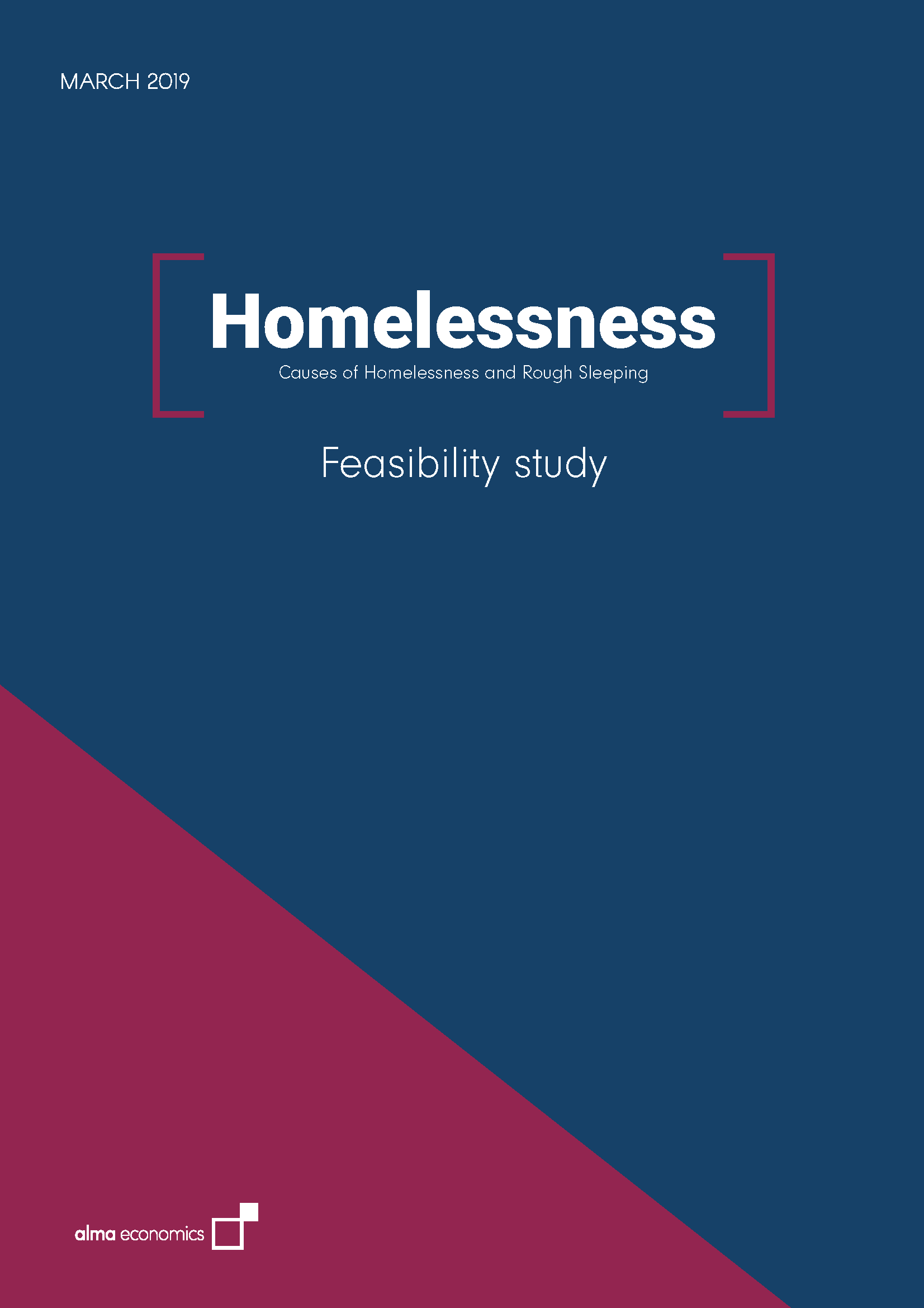RESEARCH
Housing and homelessness
Reducing homelessness and ensuring access to good quality housing for everyone is a growing challenge for governments. This is a complex issue with extensive social, environmental, and economic dimensions.
We have conducted in-depth analysis on the causes of homelessness, allowing for better modelling of future trends and the likely impact of changes in policy and the economic environment. We have also supported work to better protect vulnerable groups, such as by informing the design and allocation of housing support grants.
Below you can find some of our recent work.
Exploring the allocation of social housing in Wales — Welsh Government
Commissioned by the Welsh Government, we conducted an exploratory analysis of social housing allocation in Wales. Building on our prior work, this research provided critical insights into how social housing is allocated, particularly for individuals experiencing homelessness, and how the relationship between local authorities and housing associations may impact this allocation.
Our methodology combined quantitative and qualitative approaches. We designed a novel data collection template for local authorities, creating a unique dataset on housing allocations by homelessness duty. Using Python, we analysed this data to explore housing register sizes and allocation trends across local authorities. Alongside this, we conducted bilingual interviews with all 22 Welsh local authorities, 17 registered social landlords, and 10 stakeholder organizations, capturing diverse perspectives on allocation practices and challenges.
The findings, presented through an interim presentation and a final report, are helping to shaping the Welsh Government’s homelessness and social housing policies.
➥ The report is available here.
➥ The executive summary can be accessed here.
Intermediate Care for People Experiencing Homelessness: Cost-benefit Analysis - Pathway
People experiencing homelessness in England face significant healthcare challenges. They have complex needs, a high frequency of visits to hospitals, and require longer inpatient stays. They are also likely to experience street or unsafe discharge, where patients who are medically optimised are released from hospital care without access to a safe and appropriate place to recuperate. This causes poor health outcomes and leads to repeated hospital admissions, with future support provided through unscheduled Accident and Emergency (A&E) visits. Besides creating avoidable strain on the health of patients, unsafe discharge and the associated readmissions also create additional pressure and costs on the NHS.
To address the issue of unsafe discharge and reduce the burden on healthcare services, Pathway has proposed the scaling up of specialist intermediate care facilities across England. These facilities would offer a transitional healthcare solution to bridge the gap between hospital care and stable housing for patients experiencing homelessness, providing temporary medical and social care support.
In this context, Alma Economics was commissioned to conduct a cost-benefit analysis of the proposed initiative, through the estimation of both the financial and societal impact of a nationwide programme for specialist intermediate care. The needs, costs and benefits were estimated through desk-based research, using existing literature and reports, as well as data from existing facilities that provide intermediate care across England.
We considered both the fixed costs related to setting up the facilities, as well as the semi-variable costs (e.g., rent, utilities) and variable costs (e.g., staff costs) associated with operating the facilities. With regards to benefits, we considered four types:
Cost savings associated with reducing street discharges, moving away from unplanned emergency services, and increasing the use of planned outpatient services, which have a lower cost.
Cost savings associated with minimising delayed hospital discharges.
Costs related to other public services such as criminal justice system, housing services, mental health services, and social care.
Non-financial benefits associated with the improved quality of life of patients receiving intermediate care.
Our analysis suggests that over a 10-year horizon, our cost-benefit analysis suggests that an investment of £1.1 billion into the programme will generate cumulative financial benefits of £1.3 billion and societal benefits of £4.7 billion. This indicates a positive return on investment (ROI), with every £1 invested returning £1.20 in financial savings and generating £4.30 in societal value.
The report is available here.
Financial & social impact of Homelessness Property Funds — Big Society Capital
Alma Economics was commissioned by Big Society Capital, one of the UK’s largest social impact investors, to assess and quantify the financial and non-financial impact of the Resonance Homelessness Property Funds (RHPF).
The RHPF are social impact investment funds run by impact fund manager Resonance Limited, offering homes to individuals experiencing a housing crisis. These funds acquire properties, refurbish them, and then lease them to partners, including homelessness charities and housing associations, who, in turn, lease them to households that are statutory homeless. As of March 2023, the five RHPF have collectively raised a total of £293 million and housed 3,367 people since 2013.
We estimated that with the current £293m invested in the homes and alongside support services provided to tenants, RHPF will have generated at least £312 million in public financial savings, primarily associated with savings in temporary accommodation expenses, and £143 million in wellbeing benefits over the funds’ life (2013-2035), totalling £455 million in social value. This implies that for every pound invested by a mix of public and private investors over the lifetime of the funds, the funds will not only repay investors but also generate £1.55 in financial and social value.
The significant financial and non-financial benefits quantified by this study result from the lack of good quality and affordable temporary accommodation and the challenges the public sector faces in responding to the increased demand for such housing.
➥ Find the full report here.
The right to adequate housing in Wales: the evidence base
One in three people in Wales lives in unsafe or unaffordable housing. The pandemic has highlighted these inequalities in the housing sector as lockdowns have led to people in Wales spending prolonged amounts of time at home.
Earlier in 2021, our team was commissioned by Tai Pawb, the Chartered Institute of Housing (CIH) and Shelter Cymru to explore the social and economic impact of introducing the right to adequate housing in Wales. The project consisted of two phases. The first phase of our research explored the evidence base on the right to adequate housing, including case studies of introducing similar rights to housing and policies in other countries, including cases in Finland, New Zealand, Scotland, Canada, France, Spain and South Africa.
During the second phase of our research study, we carried out a cost-benefit analysis (CBA) of progressively introducing the right to adequate housing in Wales. Our findings suggest that introducing the right in Welsh law would generate socio-economic benefits that significantly outweigh the costs. Our research findings were presented in the Senedd, the Welsh Parliament, in September 2022.
➥ Read our evidence review here.
➥ Read our cost-benefit analysis here.
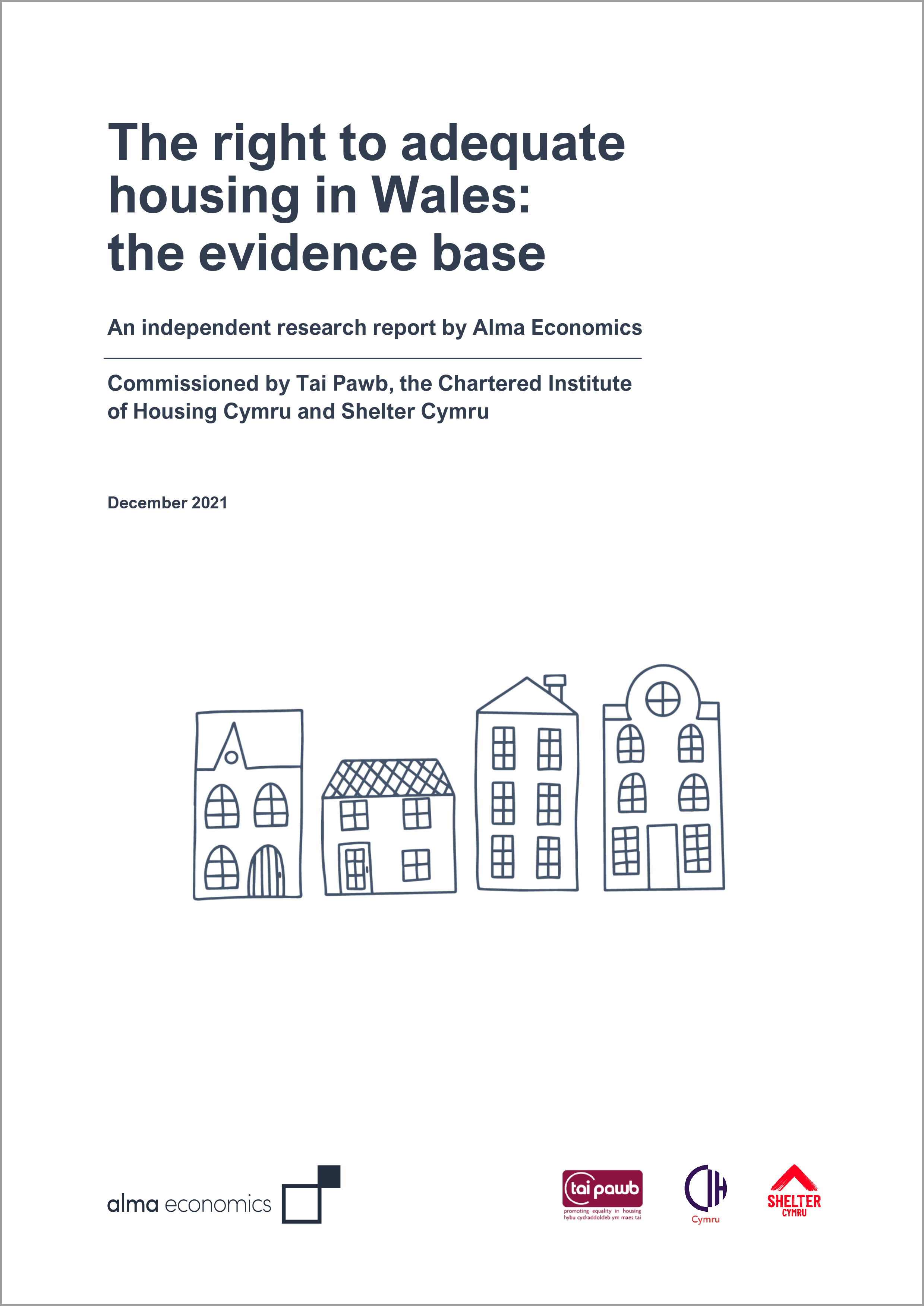
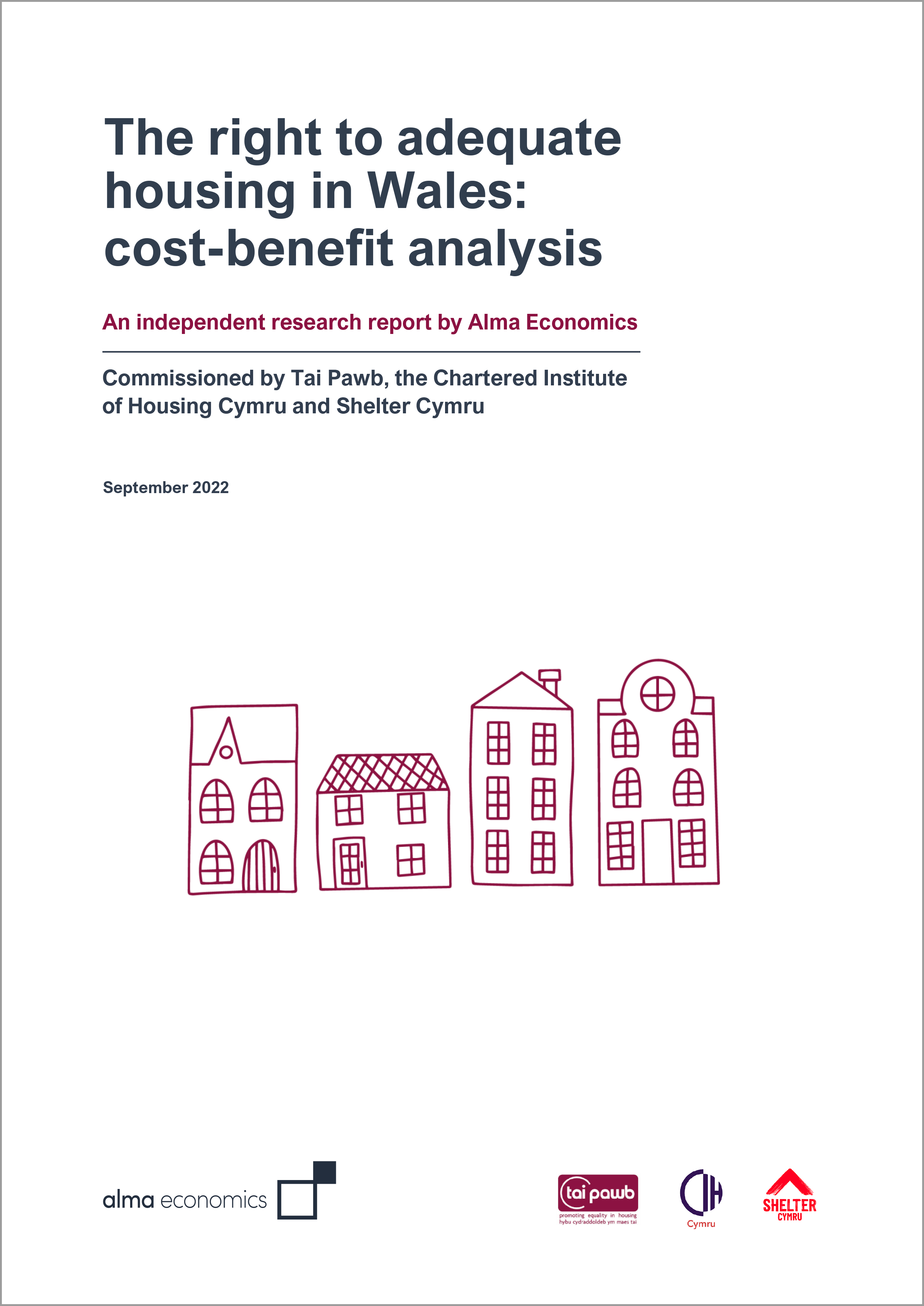
Evaluation of the Second Homes and Affordability Pilot: Phase 1 2023-2024
Housing affordability in Wales has become a growing concern in recent years, driven by reduced housing supply and rising house prices. This issue is further complicated by the presence of second homes, empty properties, and short-term lets, which, while benefitting local economies, can disrupt community cohesion, strain services, and threaten Welsh as a community language.
In response, the Welsh Government launched initiatives aimed at improving housing affordability, including the Second Homes and Affordability Pilot in the Dwyfor area of Gwynedd in June 2022. This Pilot aims to test strategies for managing future numbers of second homes, empty properties, and short-term lets, improving housing affordability, and supporting local communities. The Welsh Government commissioned Alma Economics and OB3 Research to evaluate the Pilot, running from August 2023 to December 2026. The evaluation comprises three phases: Phase 1 (scoping and exploratory research), Phase 2 (process evaluation), and Phase 3 (impact and economic evaluation).
Phase 1, completed in October 2024, focused on refining the Pilot’s scope and priorities while deepening understanding of the broader policy landscape. Key activities included a review of existing research, stakeholder engagement through interviews, focus groups, and surveys, the development of a Theory of Change (ToC) model, data mapping, and the creation of a feasibility plan to guide the Pilot’s future evaluation.
➥ Read the full report here.
Homelessness and Rough Sleeping Systems-wide Evaluation — Department for Levelling Up, Housing and Communities
Our team was commissioned by the Department for Levelling Up, Housing and Communities (DLUHC) to advise on suitable designs for a systems-wide evaluation of the homelessness and rough sleeping (HRS) system.
After performing an extensive review of the literature and data sources, we engaged with stakeholders, conducting interviews and focus groups with local authorities, service providers, and service users. Based on the findings from our fieldwork and our expertise in the HRS sector, we developed a set of options for the evaluation of funding and policymaking decisions at the central and local government levels.
Our proposed options include both qualitative approaches (e.g. Most Significant Change) and quantitative approaches (e.g. microsimulation modelling) in line with HM Treasury’s Magenta Book. We also developed a Value for Money framework to support evidence-based funding decisions that prioritise programmes providing maximum impact given the available resources.
Through the joint effort of our team of economists and developers, we also developed two innovative web tools: (i) an interactive Theory of Change bringing together pathways through which national HRS policies, programmes, and funding streams generate impact within the HRS system and (ii) an HRS service map depicting pathways of HRS service provision available to individuals at risk of or experiencing homelessness and rough sleeping.
➥ Find the full report here.
Impact on public finances of unfreezing Local Housing Allowance rates in London — London Councils
London Councils commissioned Alma Economics to carry out an economic impact assessment of ending the freeze on Local Housing Allowance (LHA) rates in London. LHA rates serve as the upper limits for housing support in private rented properties, applicable to claimants of Universal Credit and Housing Benefit. In 2023/24, the LHA rates were determined by the 30th percentile of the 2020/21 market rents, having remained stagnant since 2020/21.
Our goal was to estimate the impact ending this freeze would have on public sector finances, specifically the additional public expenditure required to fulfil the higher LHA rates and the financial savings resulting from reduced levels of homelessness. To quantify these financial costs and savings, we built an economic model using aggregate data on housing support and estimated the impact of the LHA rates freeze on the number of people experiencing homelessness.
We found that the average annual cost of the policy change was between £630 and £857 million per year, whereas the average annual savings were estimated to be between £33 and £45 million per year. These savings are quite modest, representing only 5% of the costs.
The above cost and savings estimates relate solely to the impact on public finances. They do not take into account social welfare benefits including welfare gains from better accommodation conditions and reduced levels of poverty and homelessness. Regarding the latter, it was estimated that maintaining the rates freeze would lead to an additional 16,500 to 22,000 London households becoming homeless over the period from 2024 to 2030.
Our research contributed to the growing number of voices calling for unfreezing the LHA rates. This was addressed in the 2023 Autumn Statement when the Government announced the end of a four-year freeze, effective from April 2024.
Data mapping and visualisation on the housing rental market in Wales — Welsh Government
Affordable housing allows people to live healthy and productive lives in inclusive communities. In recent years, rents in Wales have increased and there has been lower availability of affordable rental units, exacerbated by the post-pandemic cost-of-living crisis.
Alma Economics was commissioned by the Welsh Government to identify and map current and historical data on rents and affordability in Wales. The purpose of our research was to develop an understanding of the rental market structures in Wales in order to inform relevant policy development.
Our team carried out scoping interviews with rental market stakeholders and data holders to understand the policy environment and obtain available data. We also reviewed relevant documentation and followed a systematic approach to search, identify and review publicly available datasets. We then analysed data trends, patterns and geographical breakdowns across housing indicators and produced accessible spatial maps and data visualisations to present key indicators of the Welsh housing rental market.
The report is available here.
The executive summary can be accessed here.
Models of housing and support to reduce risks of COVID-19 infection and homelessness: the Moving On Pilot Randomised Controlled Trial (RCT)
Alma Economics contributed to Moving On, the UK’s first-ever randomised controlled trial focused on homelessness policy, working as part of a multi-disciplinary team alongside experts from the Centre for Trials Research of Cardiff University, the Centre for Homelessness Impact, and others. The study was funded by UK Research and Innovation (UKRI).
In 2020, with the world under lockdown due to the COVID-19 pandemic, large numbers of individuals experiencing homelessness were housed in emergency accommodation. However, these measures were only temporary, raising questions for local authorities about how best to assist these individuals moving forward.
The Moving On study designed a pilot RCT to explore the scope for a future full trial aiming to assess the impact of settled accommodation on key outcomes – including those related to COVID-19, housing, general and mental health, employment and alcohol and substance abuse – compared to temporary accommodation.
A key aim of the pilot RCT was to assess the feasibility of recruiting local authorities and eligible participants, retention rates of participants up to 6 months post-randomisation, and the acceptability of the study and its processes (including randomisation) to single homeless households and local authorities.
This work led to the publication of a paper in the journal Pilot and Feasibility Studies.
➥ The paper is available here.
Evaluation of Leasing Scheme Wales – Welsh Government
Alma Economics was commissioned by the Welsh Government to evaluate Leasing Scheme Wales. This scheme is funded by the Welsh Government and managed by local authorities, offering property owners the opportunity to lease their properties to local authorities for guaranteed rental payment for 5 to 20 years. The aim is to improve access to the private rented sector, provide longer-term security of accommodation, offer affordability, improve housing standards, and contribute to reducing homelessness.
An interim report has been completed, including a baseline process evaluation using surveys, focus groups, and interviews. To understand the scheme’s delivery so far, we interviewed representatives of local authorities participating in the scheme and engaged with scheme-participating property owners through a survey, interviews, and focus groups. We also engaged a small number of tenants through a survey and interviews. To gain the views of those not yet part of the scheme, we surveyed, interviewed, and carried out focus groups with non-scheme-participating property owners.
Our findings suggest that future efforts could be targeted towards raising awareness of the scheme’s benefits for property owners, increasing the support and resourcing for local authorities to administer and advertise the scheme, and upscaling incentives for property owners.
We have moved into our third phase of the evaluation to assess emerging impacts of the scheme. This will include further engagement with scheme-participating local authorities, including those who have newly joined the scheme, through interviews and collecting monitoring data. We will also prioritise the engagement of scheme-participating tenants and property owners using interviews and focus groups.
➥ The report is available here.
Causes of Homelessness and Rough Sleeping — Department for Levelling Up, Housing and Communities
Alma Economics conducted an in-depth review of homelessness and rough sleeping in the UK in a large-scale study for the Department for Levelling Up, Housing and Communities (DLUHC) and the Department for Work and Pensions (DWP).
The study was broken down into three distinct components:
A Rapid Evidence Assessment (REA) on the potential causes of homelessness and how these differ geographically and across different groups.
A review of existing models of homelessness used by policymakers in the UK and abroad.
A feasibility study to inform the development of analytical models for forecasting trends in homelessness and rough sleeping at the national level and across localities.
Our work provided DLUHC and DWP with the evidence base required to support the development of policy analysis tools to inform ministerial decision-making.
➥ The reports are published on the DLUHC website.
Housing Support Grant: Development of a funding formula — Welsh Government
The Housing Support Grant is a Welsh Government programme designed to reduce homelessness and support independent living through supporting vulnerable groups. Alma Economics was commissioned to develop a new funding formula for allocating Housing Support Grant funding to local authorities across Wales.
Our team held workshops with local authorities and interviewed representatives from a variety of organisations in the sector. Based on the feedback provided and an analytical review of current and previous funding formulas, we provided the Welsh Government with a transparent five-step methodology for allocating the funding to local authorities. The proposed funding formula accounts for potential emerging trends and changes in public services demand, using objective data sources as its foundation.
➥ Our extensive proposal for the development of a funding formula for the Housing Support Grant can be found on the Welsh Government website.
Planning for the Future consultation — Department for Levelling Up, Housing and Communities
We conducted an analysis of responses to DLUHC’s (the Department for Levelling Up, Housing and Communities) Planning for the Future White Paper consultation. The consultation invited stakeholders to submit their views on reforms for plan-making, development management, development contributions, and other policy-related proposals aimed at modernising the planning process.
DLUHC received over 50,000 responses, of which 10,000 included written answers to open-ended questions submitted through an online platform as well as unstructured email responses which required comprehensive thematic analysis.
Within a timeframe of 2 months, we thoroughly processed all responses to produce a summary report. The report identified the most important emerging themes for each question, broken down by response group and other relevant aspects.
Our team of researchers and data scientists designed a methodology involving a combination of manual reading and software-assisted processing of responses to allow the delivery of our analysis on a tight timeline, while ensuring all views were taken into account.
The general framework of our approach involved machine-assisted human coding. In this setup, human coders go through the text, carefully reading a large sample of consultation responses and using qualitative research techniques to produce a codebook. On the basis of this, machine learning is then employed to code the remaining responses.
This approach maximised our ability to draw out a mix of qualitative insights (e.g. interesting ideas proposed by a small number of respondents) and quantitative insights (e.g. establishing which views were most widely held among respondents).
Evaluation of the Private Rented Sector Leasing Scheme Pilot — Welsh Government
We were commissioned by the Welsh Government to undertake an evaluation of the Private Rented Sector (PRS) Leasing Scheme Pilot. The scheme seeks to support Local Authorities in discharging their housing duties to help people who are homeless or threatened with homelessness, and to expand the choice of good quality, affordable housing options available to prospective tenants.
The aim of the evaluation was to understand how the scheme is operating in the pathfinder Local Authorities: initially in Cardiff, Carmarthenshire and Conwy in March 2020, and extended to Ceredigion, Newport and Rhondda Cynon Taf in September 2020 as a response to the COVID-19 pandemic. Semi-structured interviews were held with representatives of the pathfinder Local Authorities as well as tenants and landlords who had already joined the scheme at the time of the evaluation.
Our findings suggest that the policy has overall achieved the difficult balance between meeting the needs of tenants, landlords and Local Authorities. This is particularly important as the scheme moves toward a national rollout.
➥ The Evaluation of the Private Rented Sector Leasing Scheme Pilot and a summary can be downloaded at the Welsh Government website.
Interim Report: Evaluation of the Reducing Veteran Homelessness Programme
For the approximately 2.1 million veterans currently living in the UK, accessing suitable accommodation when moving into civilian life is a key factor for their future wellbeing. In recognition of this need, the Armed Forces Covenant Fund Trust (the Trust), on behalf of the Office for Veteran’s Affairs (OVA), launched the Reducing Veteran Homelessness Programme, running from April 2023 to the end of 2025. This Programme aims to reduce veteran homelessness and provide sustainable supported housing through: (i) Op FORTITUDE, a centralised referral pathway system for veterans facing or at risk of homelessness, designed to help them access stable housing and comprehensive support services, and (ii) grant-funded projects, which aim to increase housing capacity, provide specialised support (e.g. therapeutic services), and foster community integration for veterans.
Alma Economics was commissioned by the Trust to evaluate the impact of the Reducing Veteran Homelessness Programme. Our evaluation began with a scoping phase, which involved a desk-based review and scoping interviews with grant holders, resulting in the development of a comprehensive, interactive Theory of Change (ToC) that maps how each project is expected to drive change and create long-term impact. This was followed by a process evaluation, which assessed the effectiveness of the Programme’s delivery by engaging with grant holders, delivery organisations, frontline staff, and beneficiaries. Our team also conducted an impact evaluation, using a mixed-methods approach to assess the Programme’s impact across key areas such as employment, mental and physical health, housing needs, and wellbeing. Finally, we undertook an economic evaluation of the Programme, conducting a Cost Benefit Analysis to estimate the social return on investment.
While the Programme was initially scheduled to run for two years, it has since been extended until March 2026. The evaluation will also span several years to assess both immediate and longer-term impacts. Our report summarises the findings from the evaluation’s first year, providing valuable insights into how the Reducing Veteran Homelessness Programme is supporting veterans.
➥ You can find the report here.
Local Housing Allowance: Options for reform — Crisis UK
In a project commissioned by Crisis UK, our team carried out an evaluation of options for reforming Local Housing Allowance (LHA) rates.
We used a flexible micro-simulation model to compare the expected increase in Exchequer costs and assess the welfare and financial benefits for LHA claimants. A meticulous cost benefit analysis was offered for each reform option, with outcomes presented for each household type and income quintile.
The evaluation informed Crisis’ Cover the Cost campaign, advocating for the restoration of LHA rates to help prevent homelessness.
➥ You can find the full report on Crisis’ website.
Review of Priority Need in Wales — Welsh Government
The Welsh Government commissioned an interdisciplinary team, including Alma Economics and Cardiff University, among others, to identify options for reforming the Priority Need test. The test is used to assess homelessness services applicants’ need for housing services and identify those with priority need for accommodation, for whom councils need to secure suitable, long-term housing. The reforms aim to widen the priority need categories as part of a phased abolition strategy.
Our team was responsible for assessing the impact of the different reform options. As part of this work, we engaged with all councils in the country, gathering information on homelessness service use and costs through an online survey. We used data from the survey to develop a flexible simulation model that estimates the impact of the different reform options on key areas over the next ten years. Key areas of impact include demand for and costs of housing services and housing benefit, as well as wider financial benefits from reforming the test as a result of households exiting homelessness and rough sleeping.
Our model can be used throughout the five-year implementation of the policy reform, providing Welsh Government analysts with the robust evidence base needed to decide on the optimal implementation strategy.
➥ The Review of Priority Need in Wales can be downloaded at the Welsh Government website.
Evidence review for ending homelessness in Newcastle
In 2019, Newcastle City Council and the charity Crisis announced a formal partnership focused on ending homelessness in the city within ten years. To inform this work, the partnership sought to conduct a comprehensive evidence review. Alma Economics was asked to model expenditure on homelessness provision and associated services in Newcastle.
Our approach involved two distinct phases. First, we collected detailed data on local service expenditure and the level of provision, liaising closely with council representatives and personnel from key service providers in Newcastle. This data was then fed into our expenditure model, providing robust estimates of expenditure on homelessness services in Newcastle. We mapped expenditure estimates across various typologies (e.g., service type, client demographics and client needs).
Our analysis helped to inform the partnership’s wider strategy to end homelessness in Newcastle.
Developing an understanding of the benefits of a new housebuilding programme — Shelter
Alma Economics was commissioned by Shelter to carry out an analysis of the potential benefits of increased social housing supply at different levels of geographical disaggregation.
We developed a quantitative model to estimate costs and savings from an increased supply of social homes – allowing higher levels of allocation to those experiencing or at risk of homelessness – over the next 10 years.
Our approach included a consideration of housing need in high-pressure areas, identifying savings from reduced expenses on housing benefit. We also estimated potential labour market benefits from a new supply of social housing.
Homelessness and welfare benefits in London — Homeless Link
Alma Economics contributed to research by Homeless Link, funded by Trust for London, aiming to highlight the relationship between Universal Credit (UC), the Local Housing Allowance (LHA) and the benefit cap. Our analysis utilised official data to shed light on previously unknown aspects of Housing Benefit (HB) claimants, and provide an understanding of the impacts of the benefits system to find that:
While in theory there are enough affordable properties in many areas of London for people accessing UC, in practice, these are often not available to rent.
Those claiming a housing element as part of their UC in shared accommodation are likely to be renting a property that costs more than their UC housing element.
➥ You can read the full report here.
Financial modelling and advice for a potential Private Rented Sector Leasing Scheme — Department for Communities, Northern Ireland
Alma Economics was commissioned by the Department for Communities, Northern Ireland to deliver advice and a financial model to support the delivery of a Private Rented Sector Leasing Scheme in Northern Ireland.
We used a mixed-methods approach, grounding our advice in best practice from similar schemes and the best available evidence and data. We also collected feedback from stakeholders on proposed scheme design features through a series of focus groups and semi-structured interviews. Our work included the design of a cost-benefit analysis that provided robust estimates of baseline costs for rollout as well as the impact of different scheme options.
By making evidenced assumptions around scheme costs, benefits, and uptake for different scheme design options (e.g., rent levels, management fees, lease lengths), we were able to calculate the publicly funded subsidies needed to make such a scheme viable. We summarised our findings in a final report that will support relevant strategic decision-making.
Evidencing the Impact of the Housing Support Grant in Wales — Cymorth Cymru
Cymorth Cymru, the Welsh representative body for providers of homelessness, housing and support services, engaged Alma Economics and Cardiff Metropolitan University to assess the impact of the Housing Support Grant (HSG), a Welsh Government policy aimed at reducing homelessness and supporting independent living through supporting vulnerable groups.
Our team led the assessment of the costs and benefits of HSG. We estimated the cost savings from public services generated by the Grant, including savings for the NHS, social care, and the criminal justice system. We combined various modelling techniques, implementing best practice in cost saving estimation in the Welsh context to arrive at reliable estimates.
Our analysis provided a robust evidence base to make the case for the continuation – and possible extension – of the HSG, which currently supports over 57,000 people every year.










